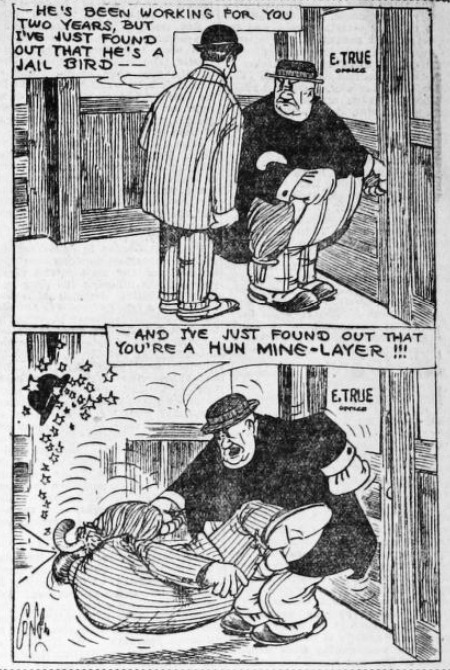this post was submitted on 24 Aug 2024
140 points (99.3% liked)
Everett True Comics
652 readers
156 users here now
A place to appreciate the twentieth century comic character Everett True of "The Outbursts of Everett True." Feel free to check out the sticky.
founded 2 months ago
MODERATORS
you are viewing a single comment's thread
view the rest of the comments
view the rest of the comments

What is a Hun-Mine layer? I feel that might be helpful on the punchline....
I am pretty sure "Hun" was a way to refer to the Germans in WW1, so a Hun Mine-Layer would be a German who laid mines... But could be totally talking out of my arse so will look it up 😂
Lots of fishing boats and merchant men were used (by all sides) to secretly drop off naval mines during WW1, it became synonymous with someone who is being treacherous and secret sabotaging.
All sides would constantly accuse eachother of secretly laying mines with civilian vessels, and all sides would constantly blame the other for accusing innocent people of laying mines. It was probably a constant source of news articles.
Oh that's actually super interesting :o thanks!
So is Atilla the Hun just Atilla the German?
Other way round. The nickname/insult was saying Germans are warlike barbarians like Atila the Hun and the rest of the the Huns.
Kaiser Wilhelm gave a speech encouraging his soldiers to "be huns" on campaign, which led to it being an insult applied to Germans.
“hun” was the “orc” of the pre-Tolkien era
1919 was the Tolkien era. He just hadn't published yet
Ehhh yes, but the stereotype already existed before that speech: https://en.m.wikipedia.org/wiki/Hun_speech
'atilla' meant something like 'little Daddy' in visigothic.
Do with that what you will
That's a little unfair because "daddy" is already a diminutive version of "dad" so you are double dipping on diminutives. It'd be more accurate to say that "atilla" is either like "little dad" or "daddy".
Yeah, that's how I understood it.
https://en.wikipedia.org/wiki/Huns
Mine layer I think means laying explosive mines? I dunno.
Man, if you don't know the answer, don't fling random shit at the wall just to hear yourself speak.
It sounds to me like this is more referencing their nomadic aspect. A nomadic people laying mines would be a great idiom.